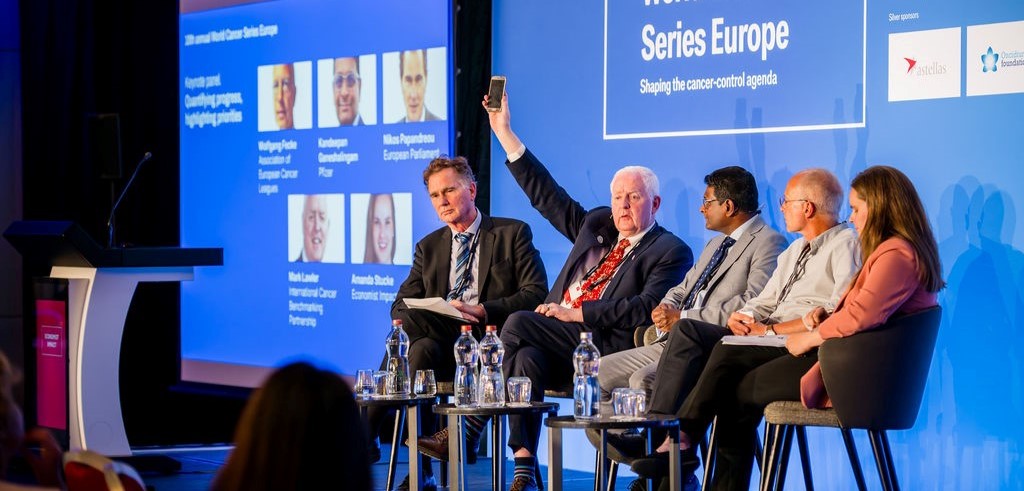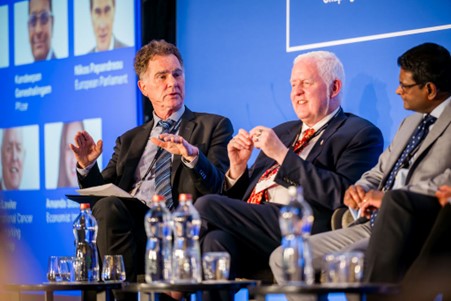PGJCCR’s Prof Lawler on Northern Ireland’s “Thomas Edison” moment
Professor Mark Lawler spoke about the digital transformation occurring in Northern Ireland healthcare at the Economist World Cancer Series Conference in Brussels.

Speaking in the opening keynote session of the Conference, Professor Lawler, Professor of Digital Health and Chair in Translational Cancer Genomics at the Patrick G Johnston Centre for Cancer Research (PGJCCR) and Health Lead of the Momentum One Zero Innovation Centre at Queen’s University Belfast highlighted the digital transformation occurring through a programme known as encompass. Data from all five hospital trusts in Northern Ireland are now linked together and patients now have access to their own data through an app called My Care.
“For the first time ever, the entire 1.8 million population of Northern Ireland can access their own health record on their mobile phone,” said Professor Lawler while holding up his phone on the conference platform.
“Make no mistake – this is a ‘Thomas Edison lightbulb' moment. It catapults Northern Ireland into the European Digital Champions League with Estonia as a digital trailblazer in health and wellbeing. This development will transform healthcare as we know it and empower data-enabled patient-centric research. The ability to do research on an entire population is extremely powerful and Northern Ireland can become a model for health and social care transformation in the digital world.”
Professor Lawler also highlighted the crucial importance of cancer research and its increasing influence on the delivery of cancer care.
“We have unambiguously demonstrated that cancer patients who are treated in research-active hospitals have better outcomes than those who are not,” he explained. “It is clear that cancer research is a necessity, not a luxury and must be an integral part of a functioning 21st century cancer care programme. Critically we have also demonstrated that people living in rural or coastal areas have poorer cancer outcomes.”
Nikos Papandreo, Member of the European Parliament and member of the Public Health Committee, re-emphasised the importance of cancer research:

‘Europe’s fight against cancer must be grounded in both evidence and equity. Too often, critical data are still missing—especially in rural, island, and underserved regions. Dis-parities in outcomes are a daily reality in and across European Member States. If we are serious about changing this, we must invest in better data systems, ensure national accountability, and embed clinical research into every part of the cancer care pathway. Only then can we deliver on the promise of Europe's Beating Cancer Plan for every citizen’.
A key thread during the discussion was the importance of data in helping patients, clinicians, researchers and policy-makers on their path towards delivering personalized cancer care across the care journey. As stressed by MEP Papandreou and Professor Lawler, inequalities cannot be addressed if they are not measured.
“Reading the Lancet Oncology European Groundshot Commission, which Professor Lawler led with a coalition of over 50 cancer leaders, including clinicians, scientists and patients, I was immediately struck by the need, as the Groundshot Commission recommends, to re-imagine cancer research and its implementation in Europe, with data as a key enabler,” said Papandreou. “In the European Parliament, we are keen to engage with the cancer community to make these recommendations real, so that the great discoveries that we make in Europe are translated into real benefits for our citizens, patients and European society as a whole.”
